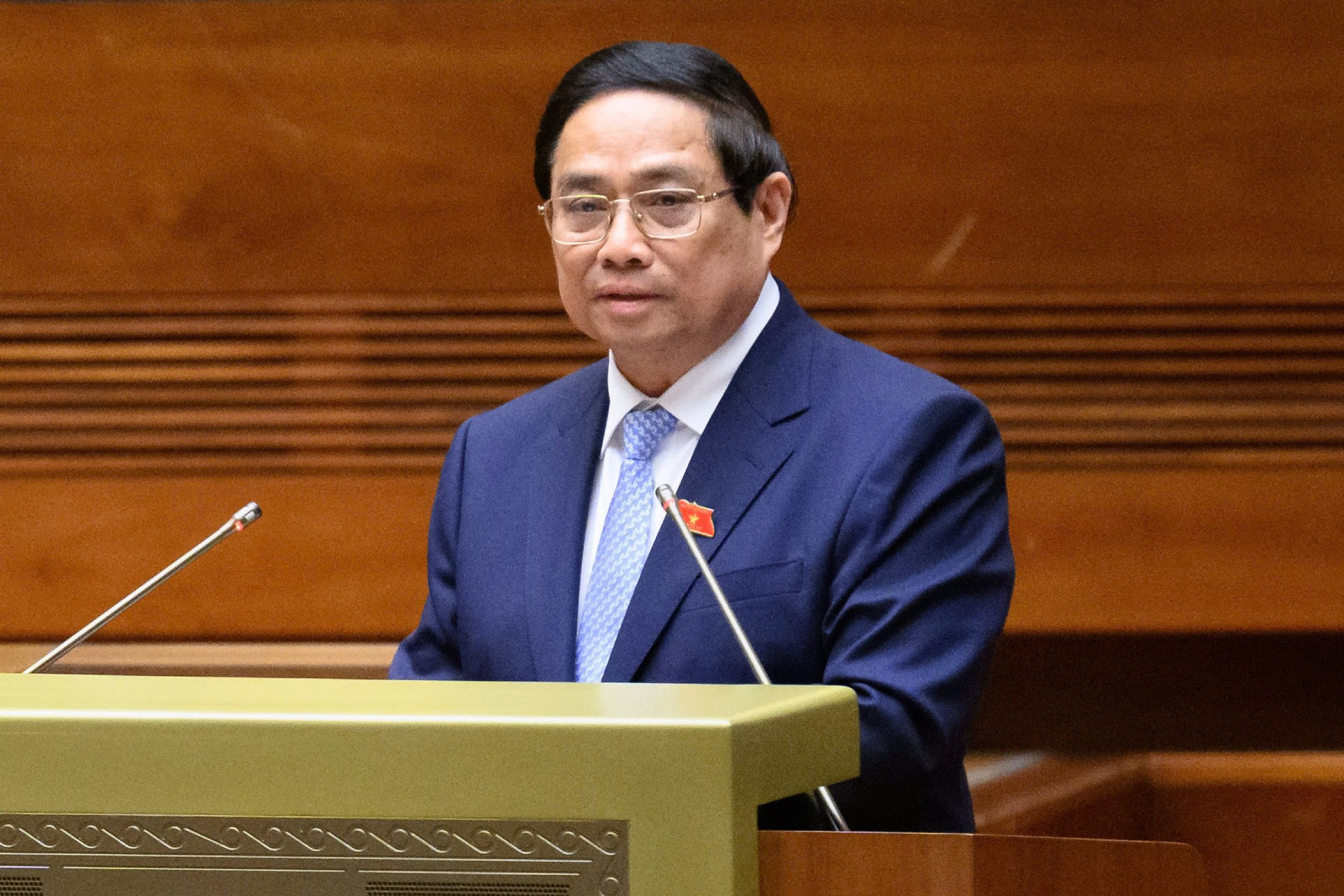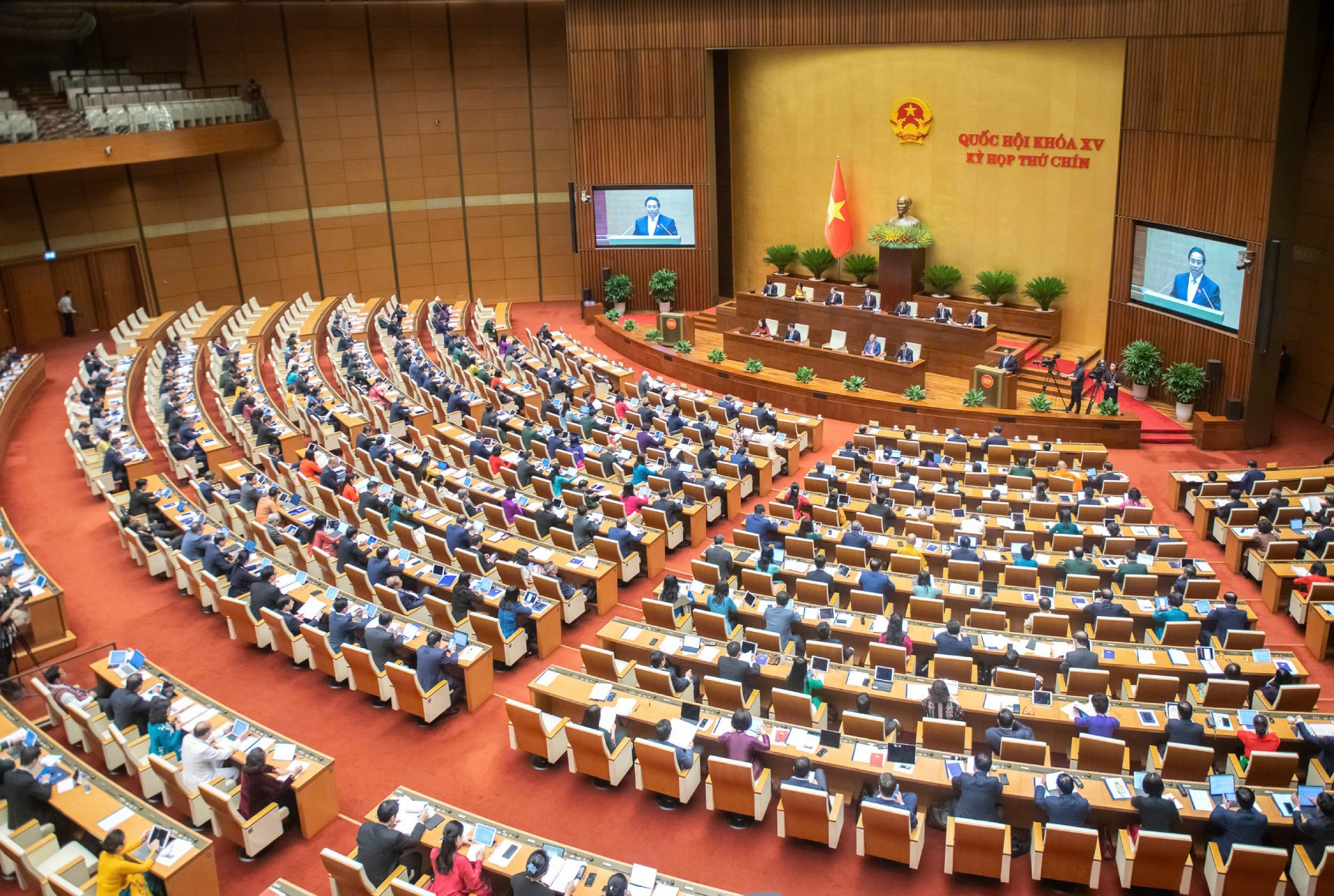During the opening session of the ninth meeting of the National Assembly on the morning of May 5, the Prime Minister presented an additional assessment of the implementation of the 2024 socio-economic development plan and the progress achieved in the first months of 2025.
Prepared to negotiate with the U.S. under the principle of "shared risks - mutual benefits"

In a context of global uncertainty, the Prime Minister said that Vietnam's achievements in 2024 were commendable and praiseworthy, surpassing those of 2023, especially in maintaining internal stability and external harmony. These efforts were recognized both domestically and internationally.
However, he noted that the world has experienced complex and unpredictable developments since the beginning of the year, particularly the U.S.'s sudden announcement of sweeping retaliatory tariffs, which negatively impacted global economic growth and disrupted supply chains and trade flows.
“We remained calm, proactive, and implemented timely, flexible, and appropriate responses. As a result, Vietnam became one of the first countries the U.S. agreed to negotiate with,” the Prime Minister stated.
He added that he is closely directing the negotiation team and relevant ministries to finalize strategies and prepare for negotiations with the U.S., adhering to the principle of "shared risks - mutual benefits."
Regarding recent economic performance, GDP growth in Q1 reached an estimated 6.93%, the highest among all Q1 periods between 2020 and 2025. Several provinces posted double-digit growth. In the first four months, macroeconomic stability was maintained, inflation was well-controlled, and major economic balances were ensured.
The country’s socio-economic infrastructure has also developed in a modern, synchronized manner, with priority given to key projects such as expressways, high-speed railways, airports, seaports, and infrastructure for education, healthcare, and social services. Eighty strategic projects were launched or inaugurated to mark the 50th anniversary of national reunification. Early pension and social security payments for May were distributed, and preferential credit packages were implemented to support consumer loans and affordable housing for young people, the poor, and low-income earners. High-quality human resources, especially in fundamental science, semiconductors, chips, key engineering, and core technologies, were actively developed.
The Prime Minister highlighted that institutional building and legal framework improvements had been carried out with increased efficiency and quality over a short period.
At this session, the government submitted the largest number of draft laws and resolutions ever presented in one session (44 proposals), including major strategic initiatives in science, technology, private sector development, comprehensive amendments to financial laws, and special mechanisms for legal practitioners.
The government’s streamlining of its apparatus has been completed, reducing the number of ministries and ministerial-level agencies from 22 to 17 (14 ministries and 3 equivalent agencies). The restructuring of administrative units at all levels and the creation of a two-tier local governance model has been implemented rapidly and effectively.
Cutting administrative procedures by at least 30%

The Prime Minister acknowledged ongoing limitations, such as underperforming traditional growth drivers, low public investment disbursement, slow domestic demand recovery, and heavy export dependence on FDI amid adverse tariff policies from the U.S.
New growth drivers are still in their early stages and need more time to show impact. The real estate market remains sluggish and carries risks. Administrative procedures are still cumbersome, hindering businesses and citizens. A “top hot, bottom cold” situation remains, with inconsistent execution across government levels.
Despite challenges outweighing advantages, the Prime Minister sees this period as a chance for Vietnam to restructure its economy, markets, production, products, and exports with renewed determination for a breakthrough.
To achieve a growth target of 8% or more, an economic scale of over $500 billion (potentially ranking 30th globally, up two places), and per capita GDP exceeding $5,000 in 2025, the Prime Minister urged all levels and sectors to implement their tasks decisively and synchronously.
He stressed the importance of closely monitoring domestic and international developments, proactively forecasting, and responding with flexible and timely policies, especially regarding U.S. tariffs. Growth must go hand in hand with macroeconomic stability, inflation control, and maintaining economic balances. The government aims to broaden its tax base, ensure accurate and timely tax collection, and combat tax evasion - particularly through digital invoices - to increase state revenue by over 15%.
The Prime Minister also instructed proactive, flexible, and effective monetary policy, closely coordinated with a reasonably expansionary and targeted fiscal policy.
He called for effective negotiation strategies with the U.S. that protect Vietnam’s legitimate rights and interests while promoting balanced and sustainable trade. The government will quickly issue a decree on strategic trade control, tighten the monitoring of product origin, diversify markets and supply chains, and implement timely support for businesses and workers affected by U.S. tariffs. Special policies will be drafted to develop high-potential border economic zones, free trade zones, and new special economic regions such as Van Don, Van Phong, and others.
By 2025, Vietnam aims to eliminate at least 30% of unnecessary business conditions, reduce the processing time of administrative procedures by at least 30%, and cut procedural costs by at least 30%.
The Prime Minister reiterated that reforms to state governance and the political system must be thorough and complete, not half-hearted.
In parallel, ministries and sectors must review and amend laws related to inspections, citizen feedback, complaint resolution, and anti-corruption. The fight against corruption, waste, and misconduct must continue with urgency and persistence.
The Steering Committee for resolving stalled projects will enhance its role in unlocking resources and promoting economic development, especially in cities like Ho Chi Minh City, Da Nang, and Khanh Hoa where unresolved legal issues have stalled land and project development.
Tran Thuong